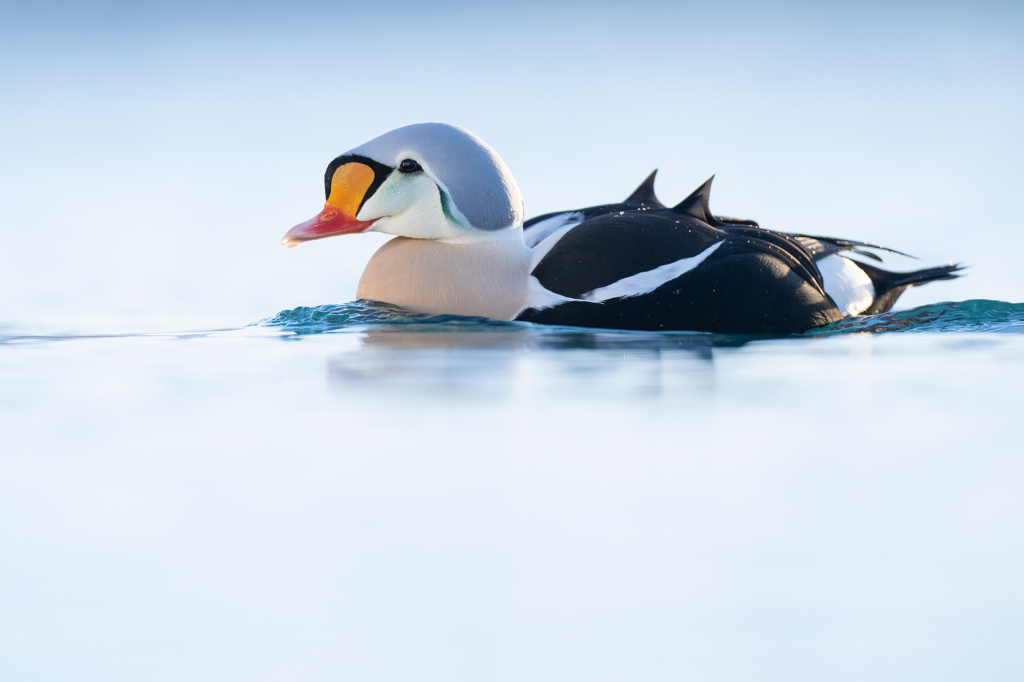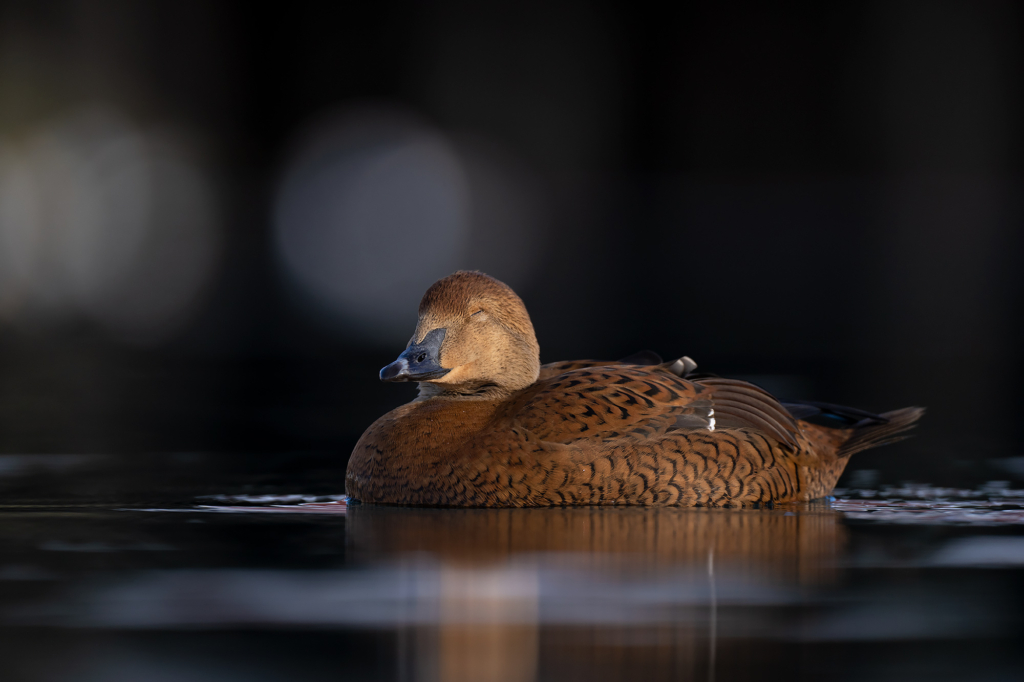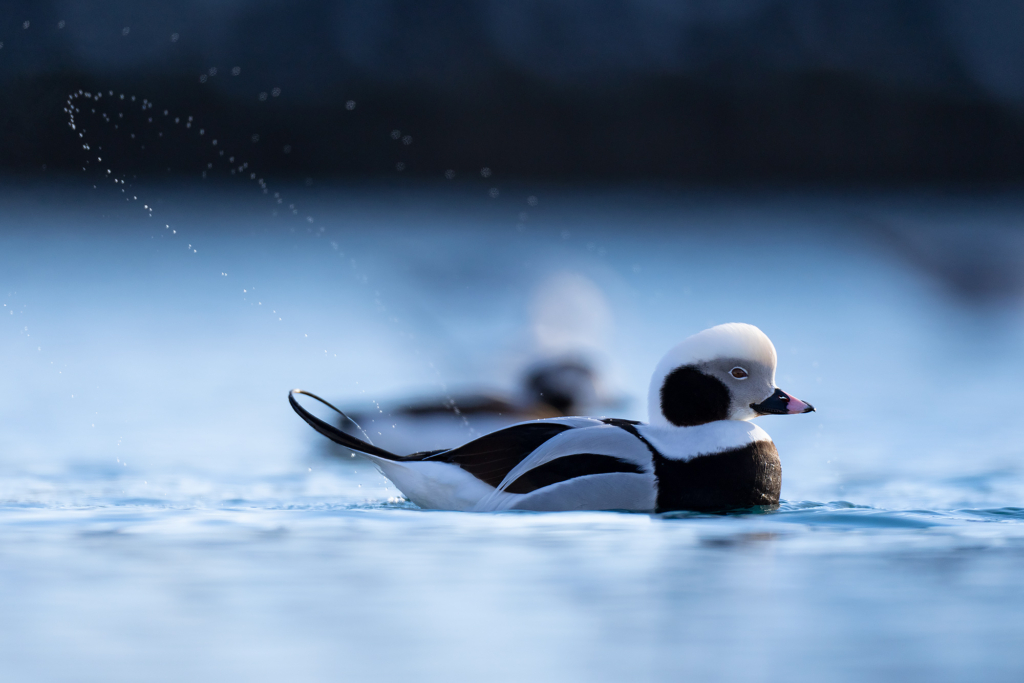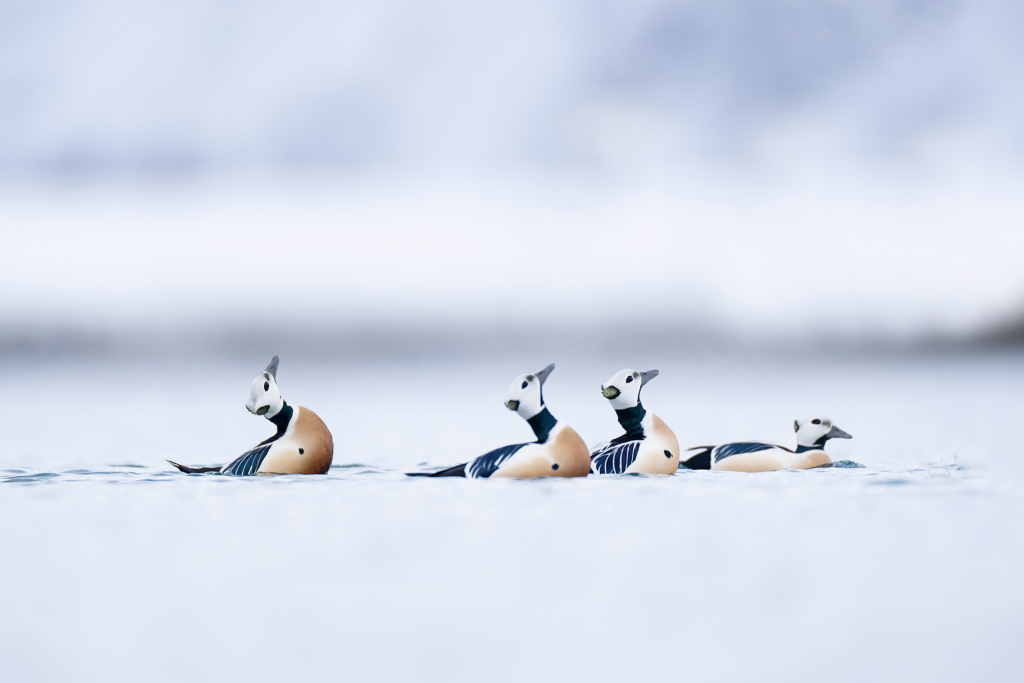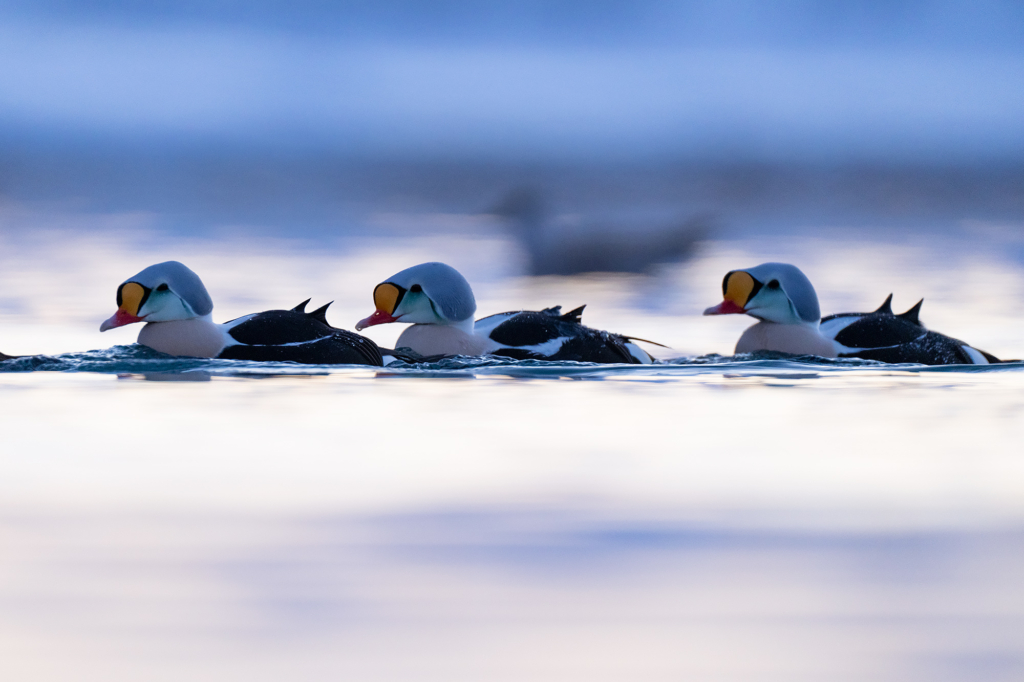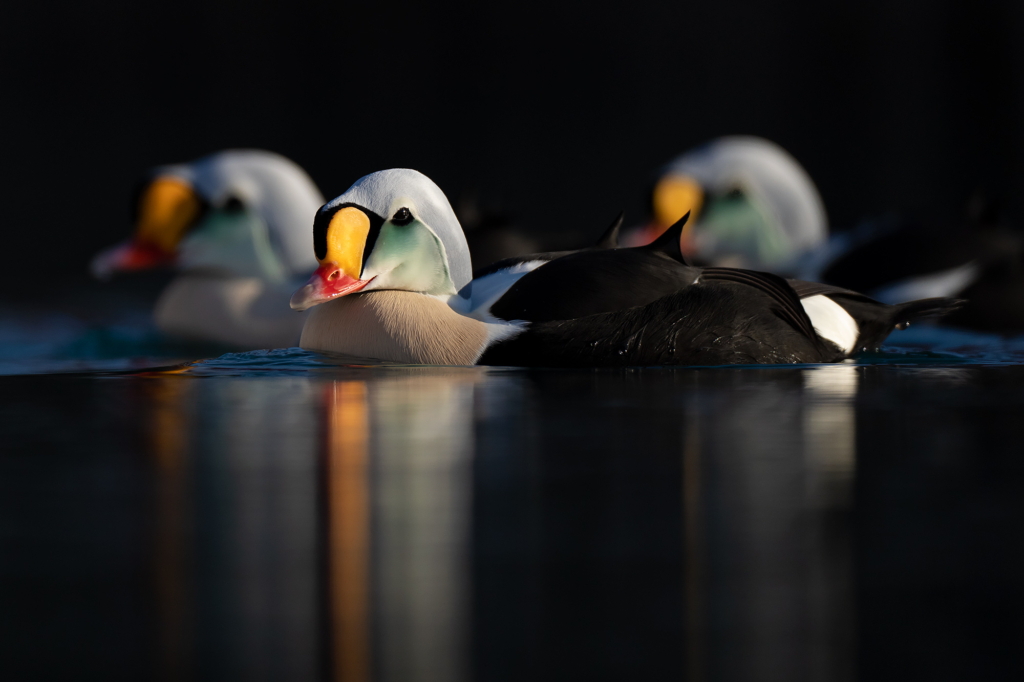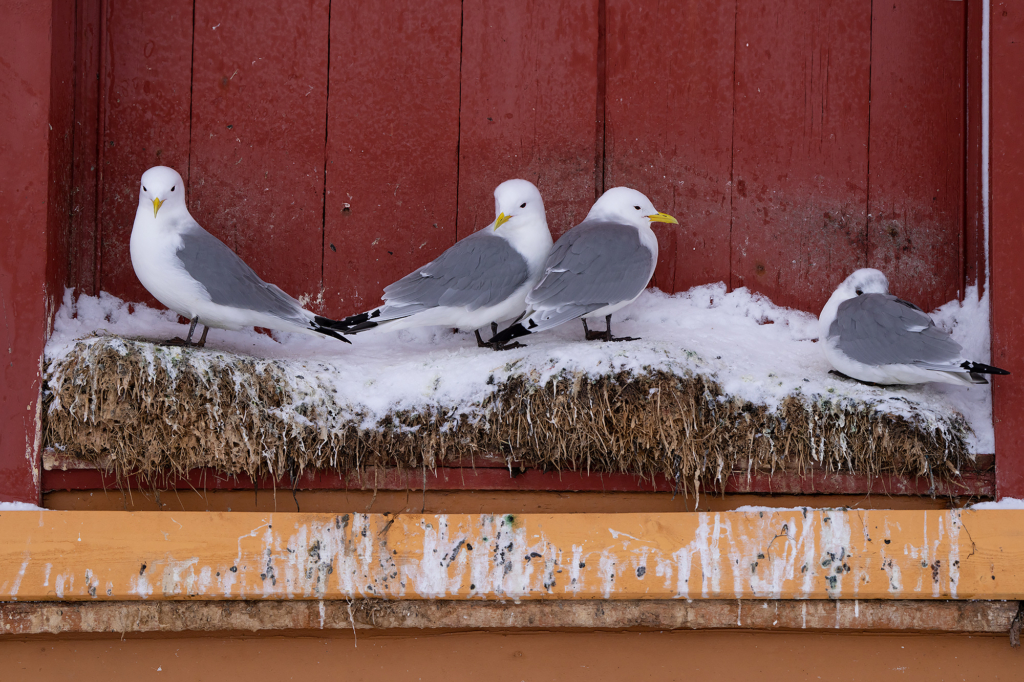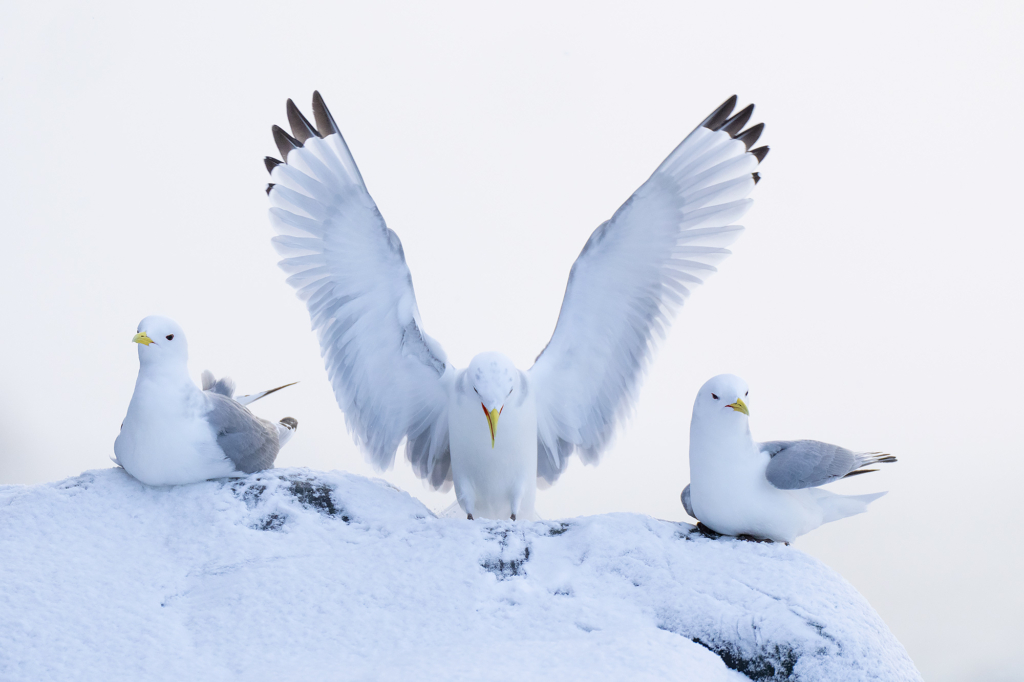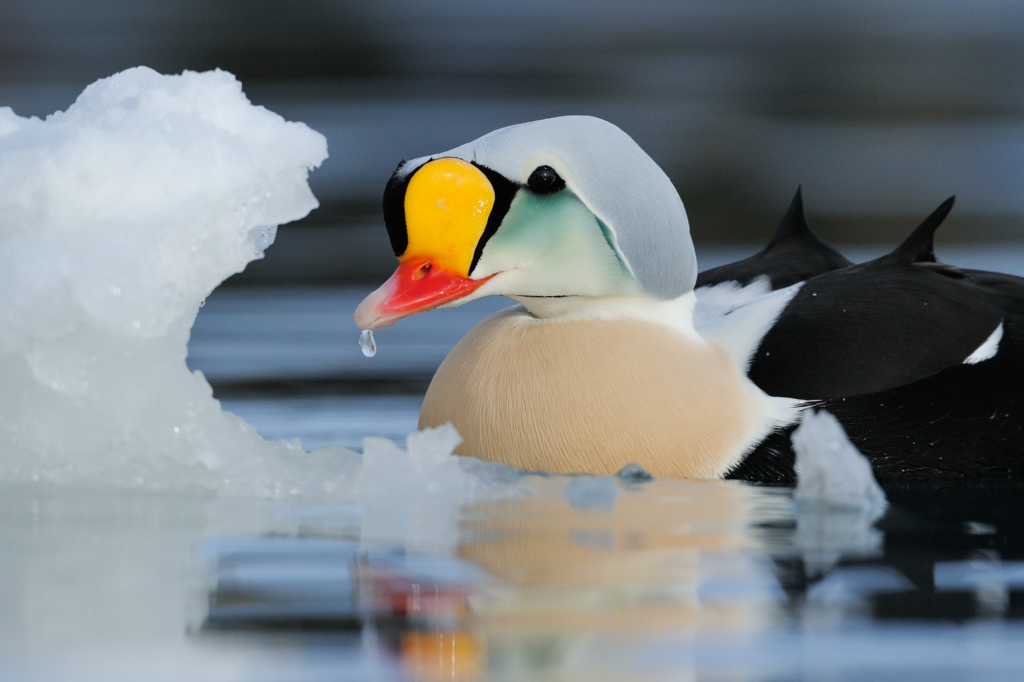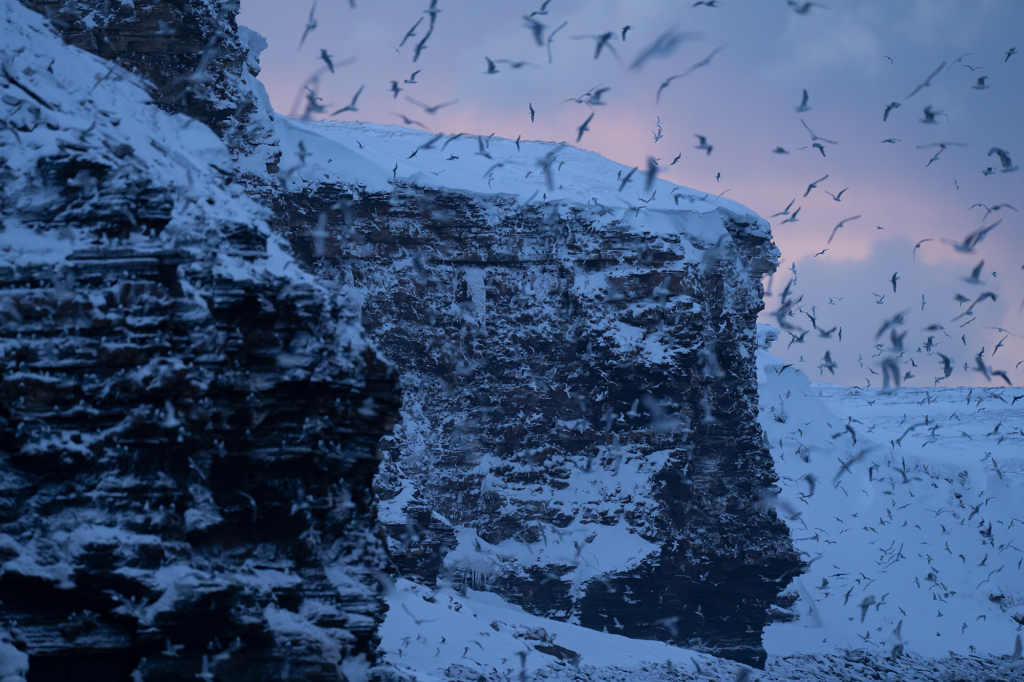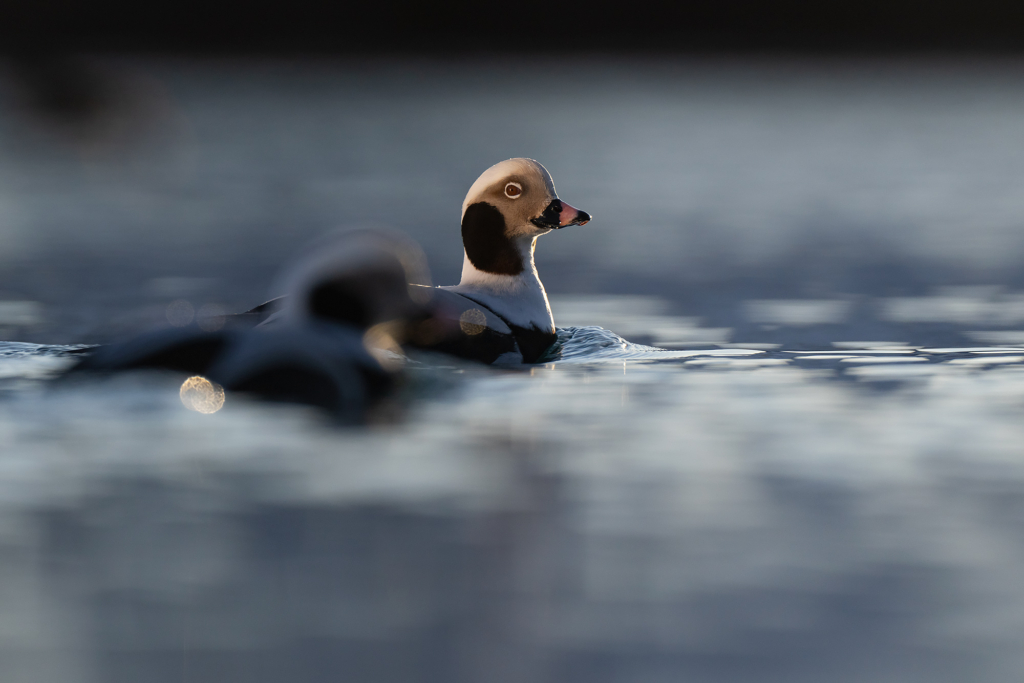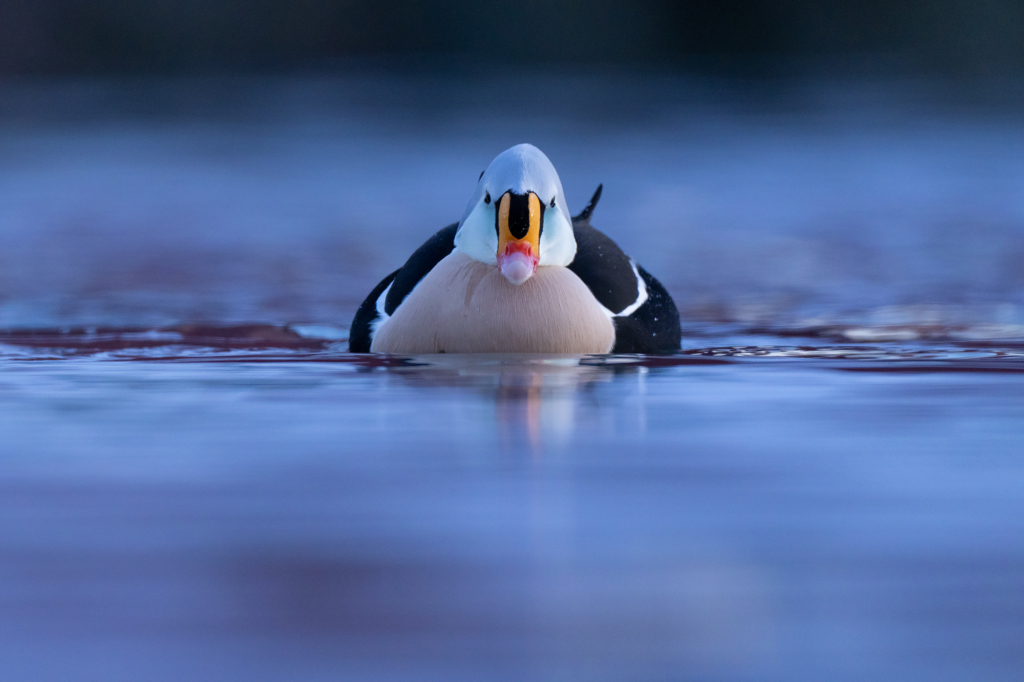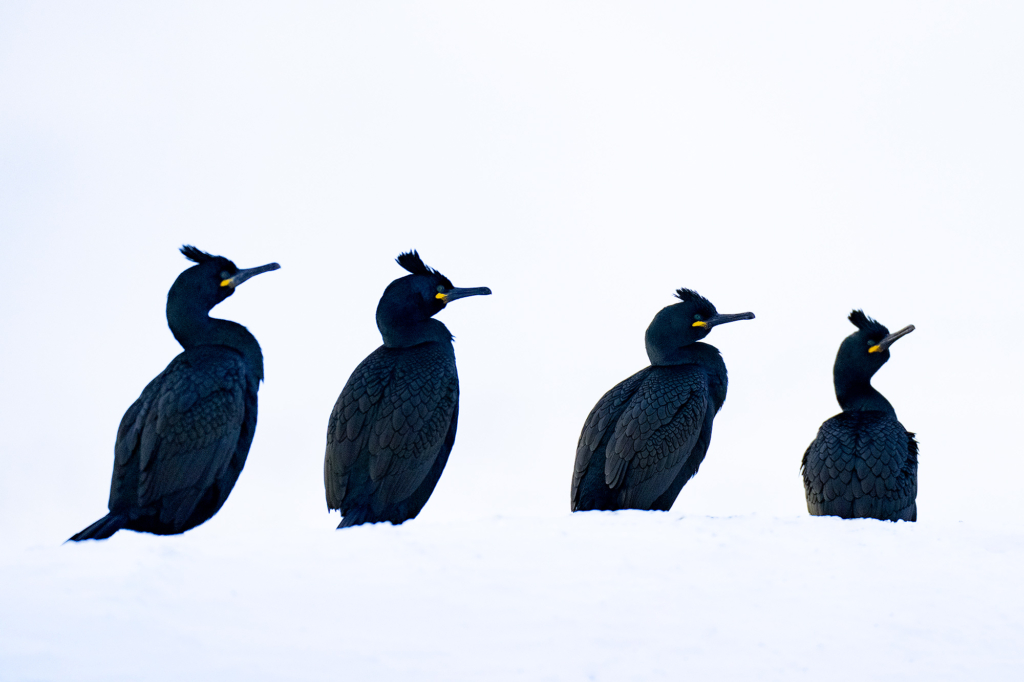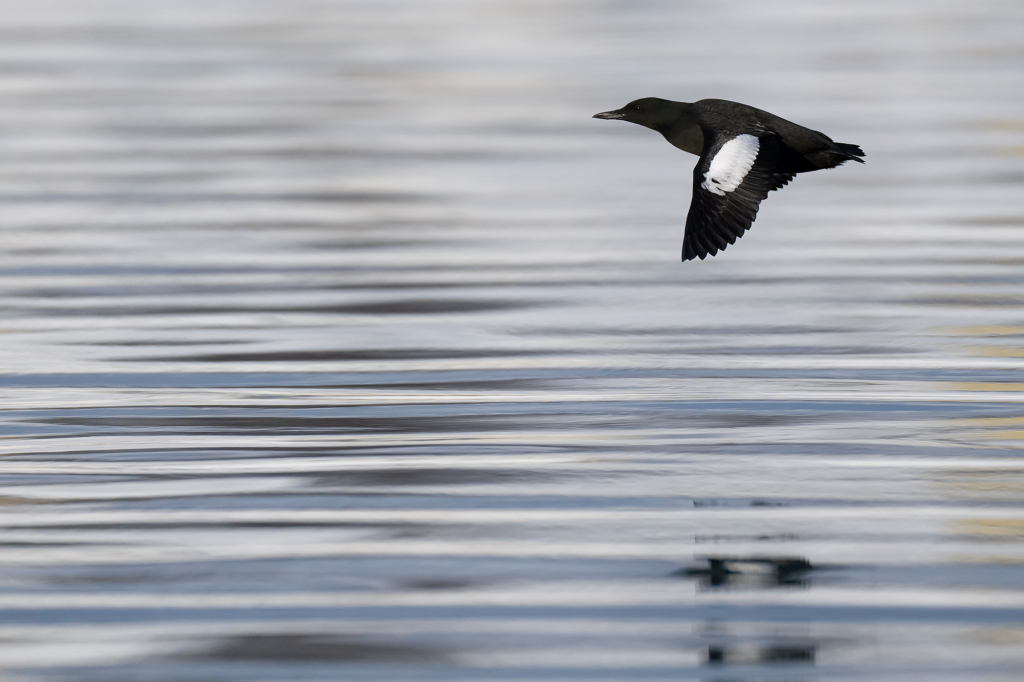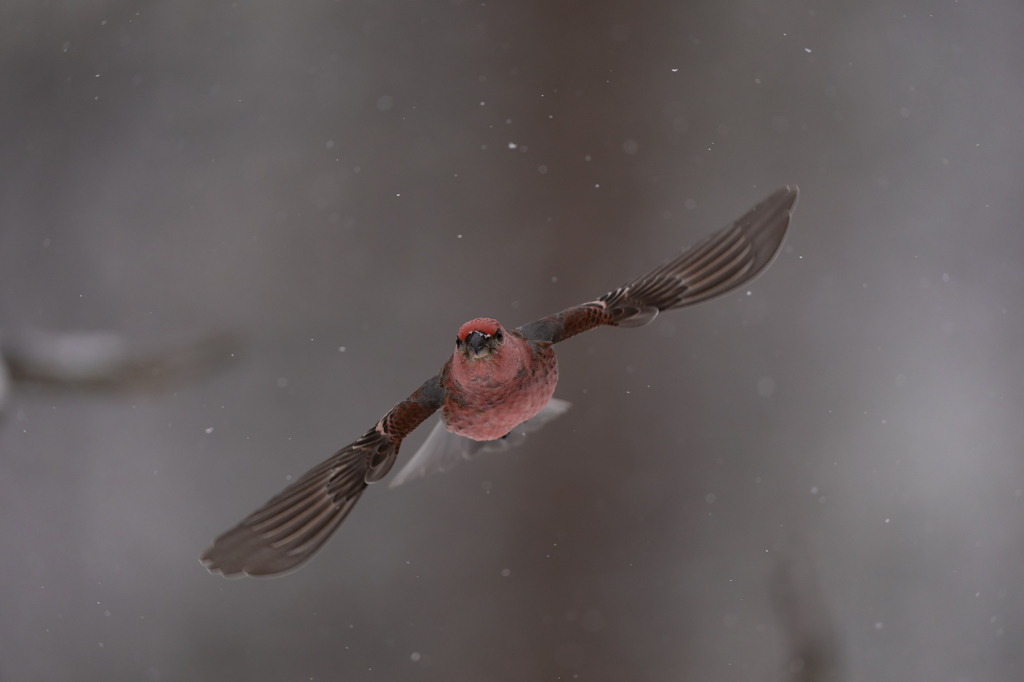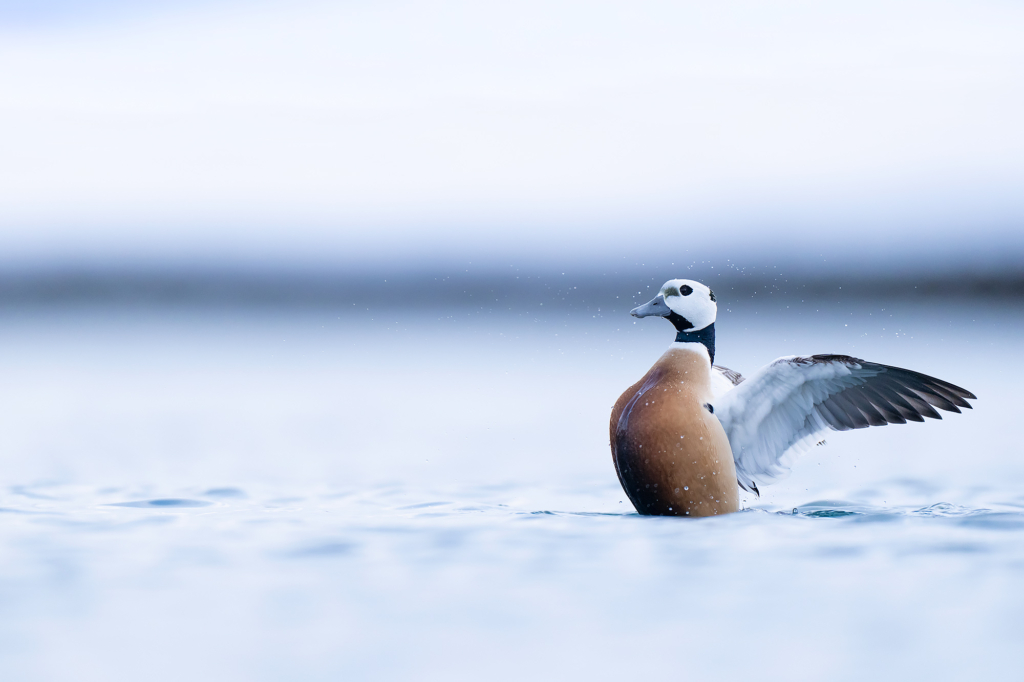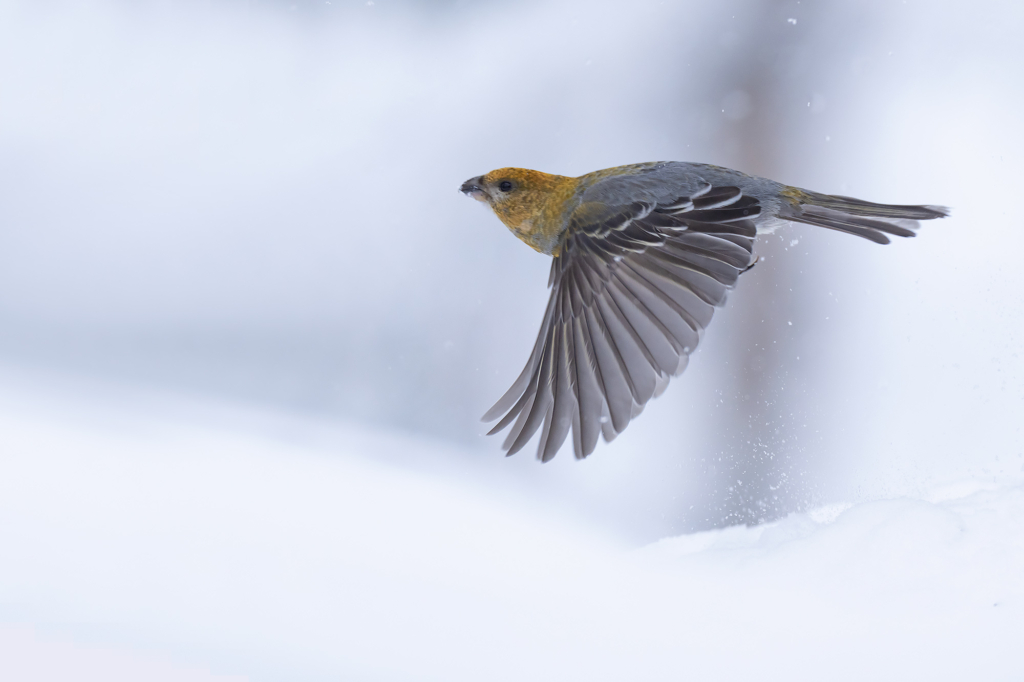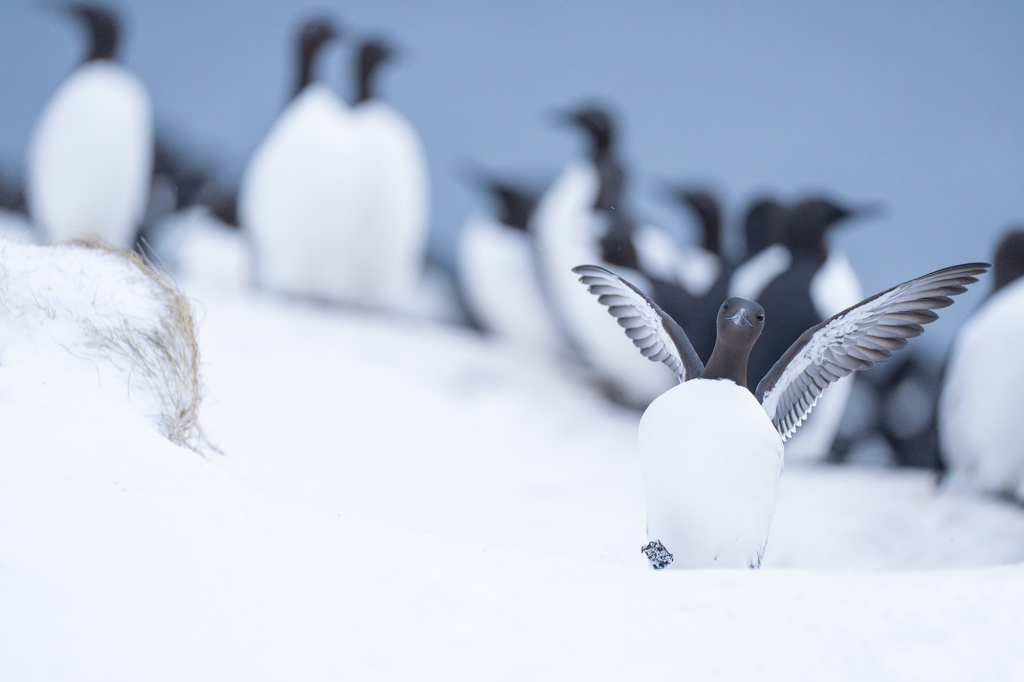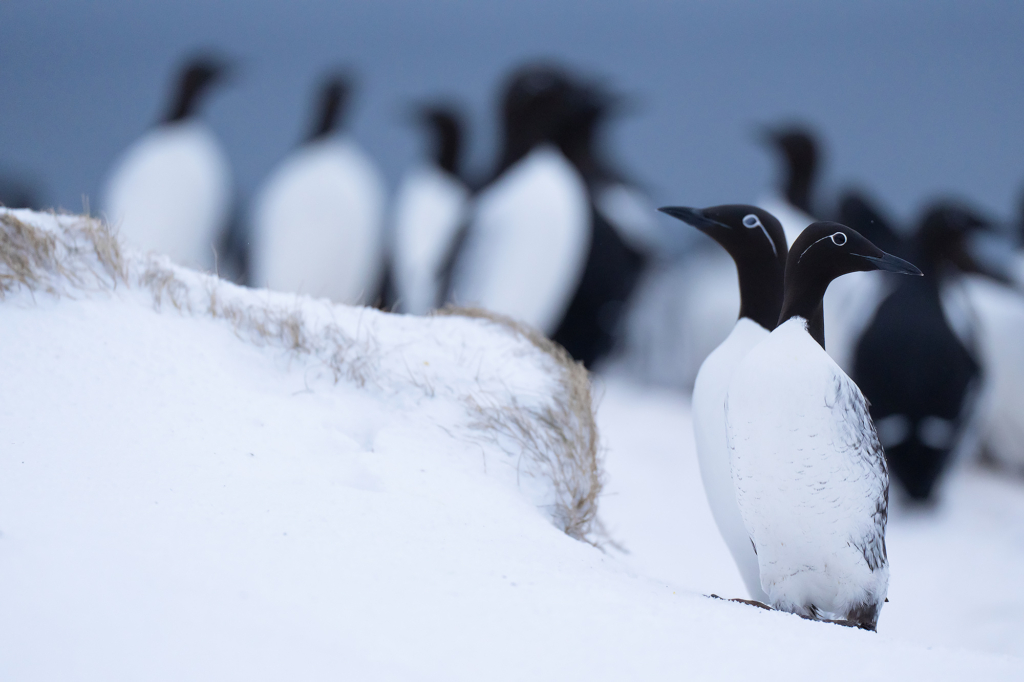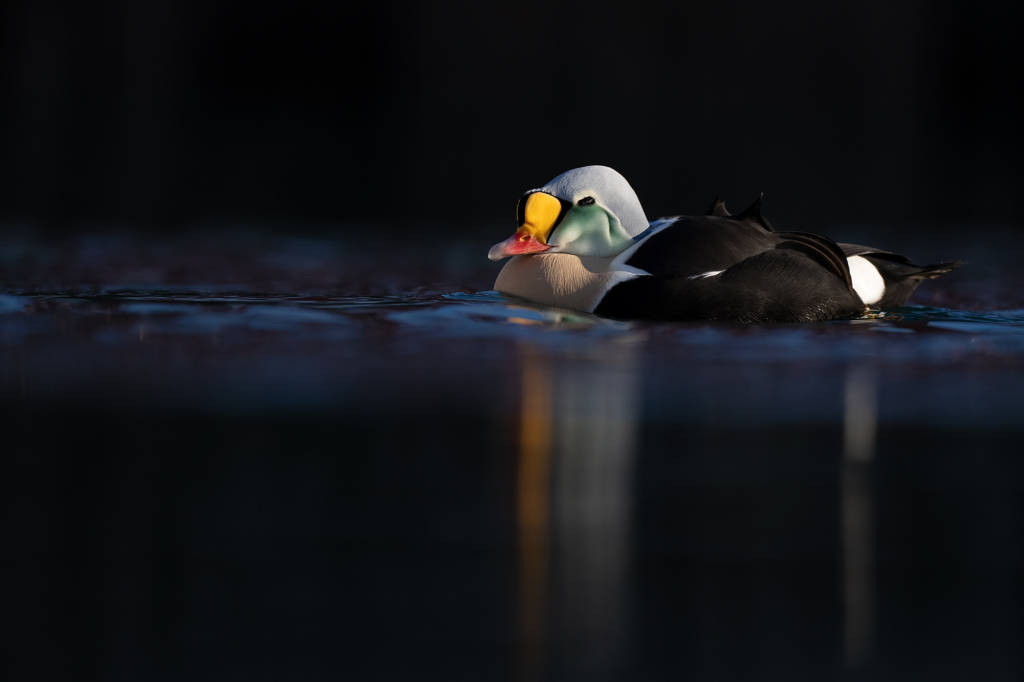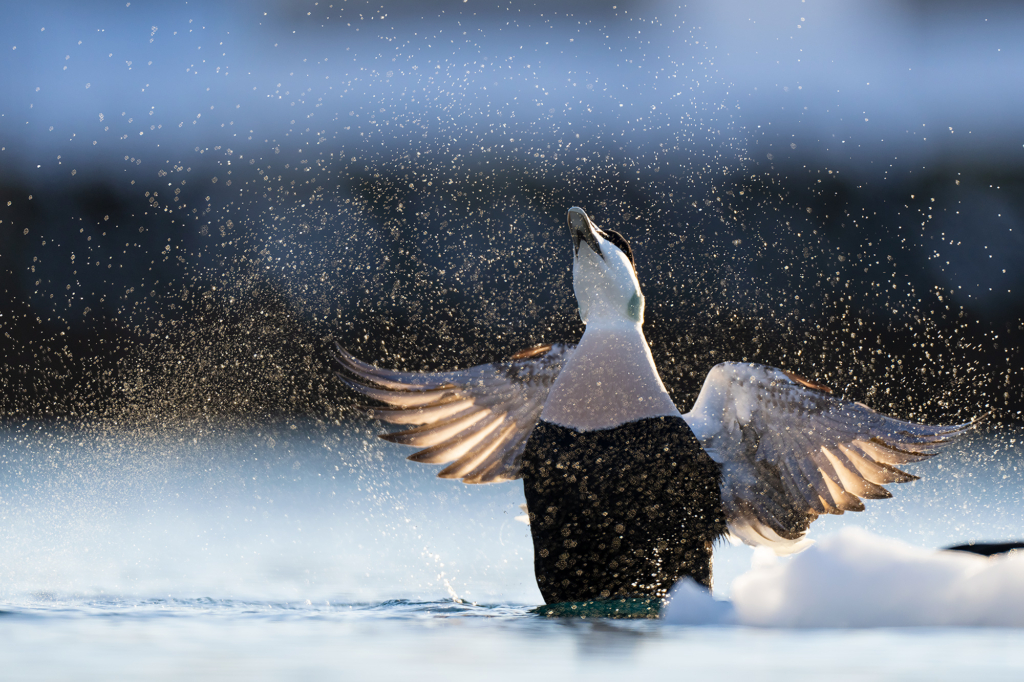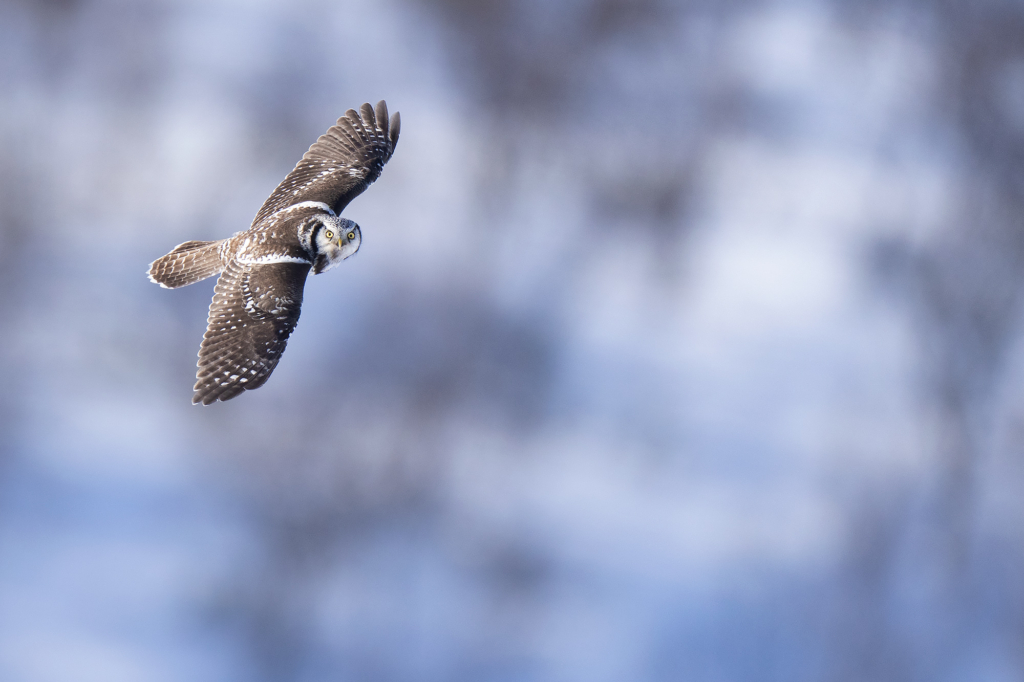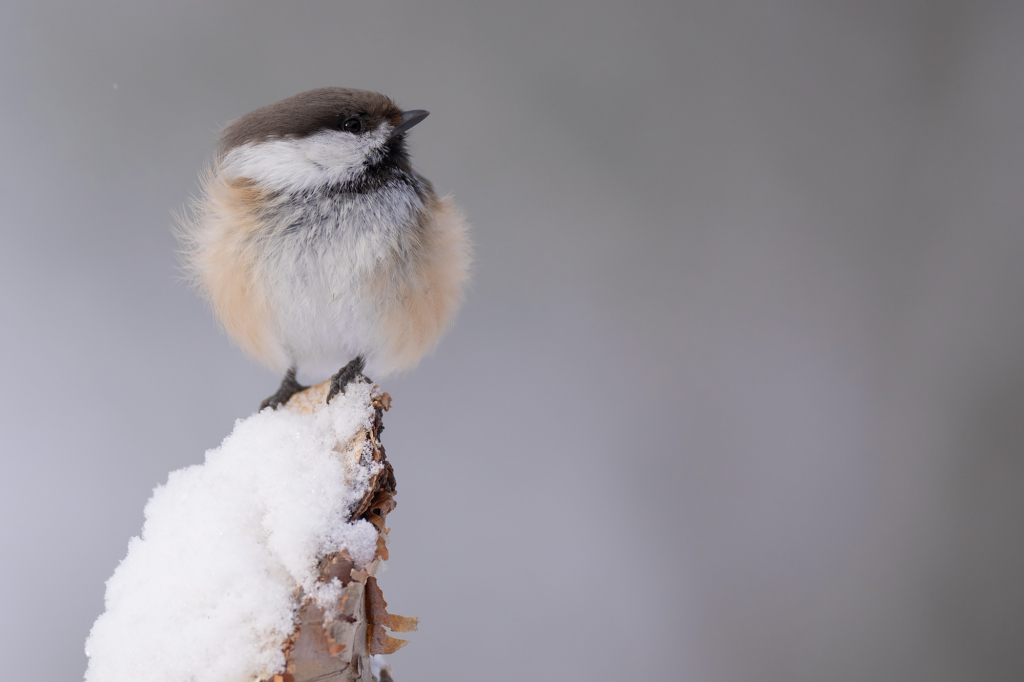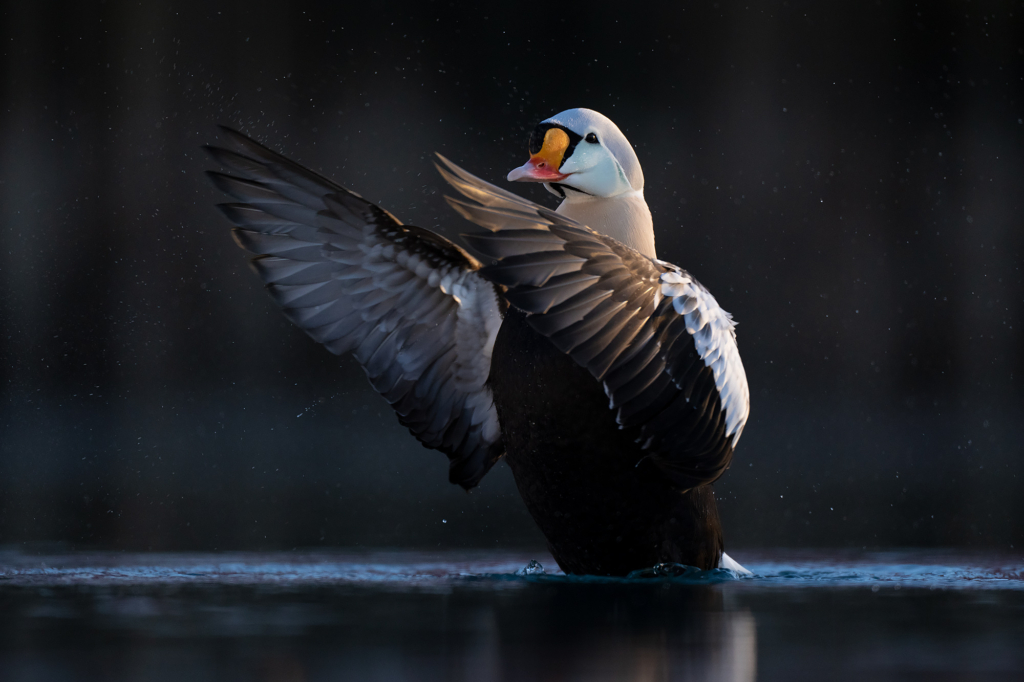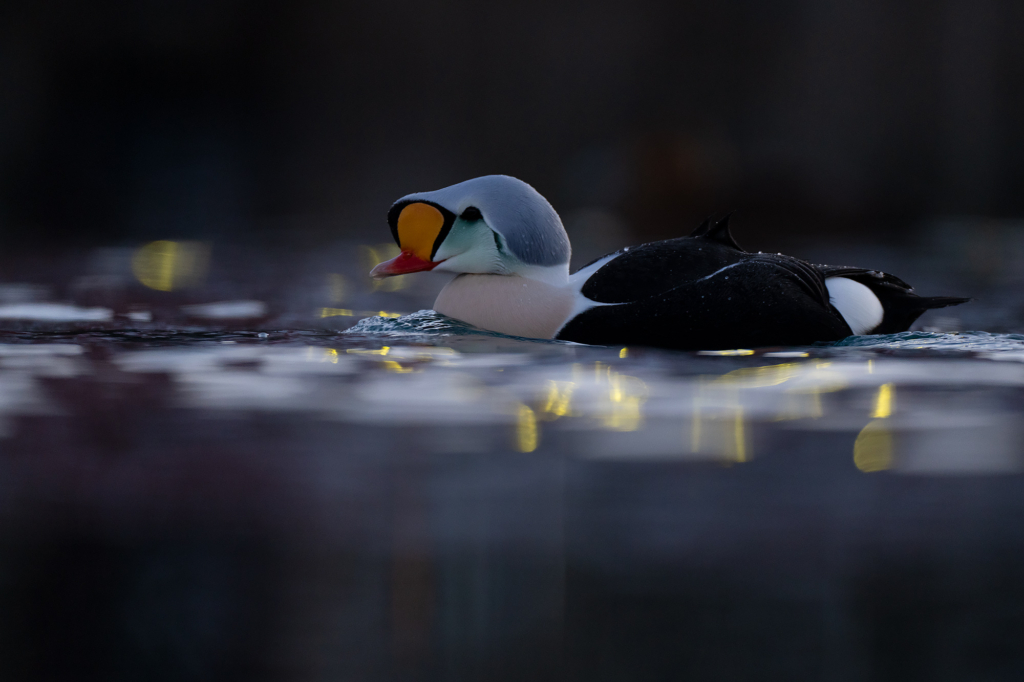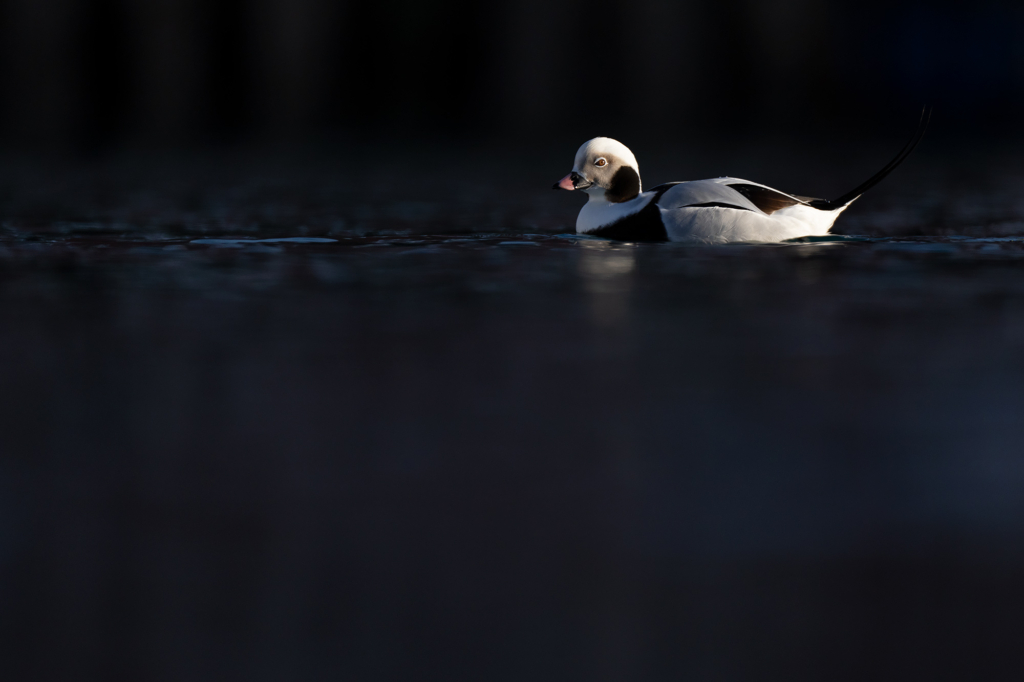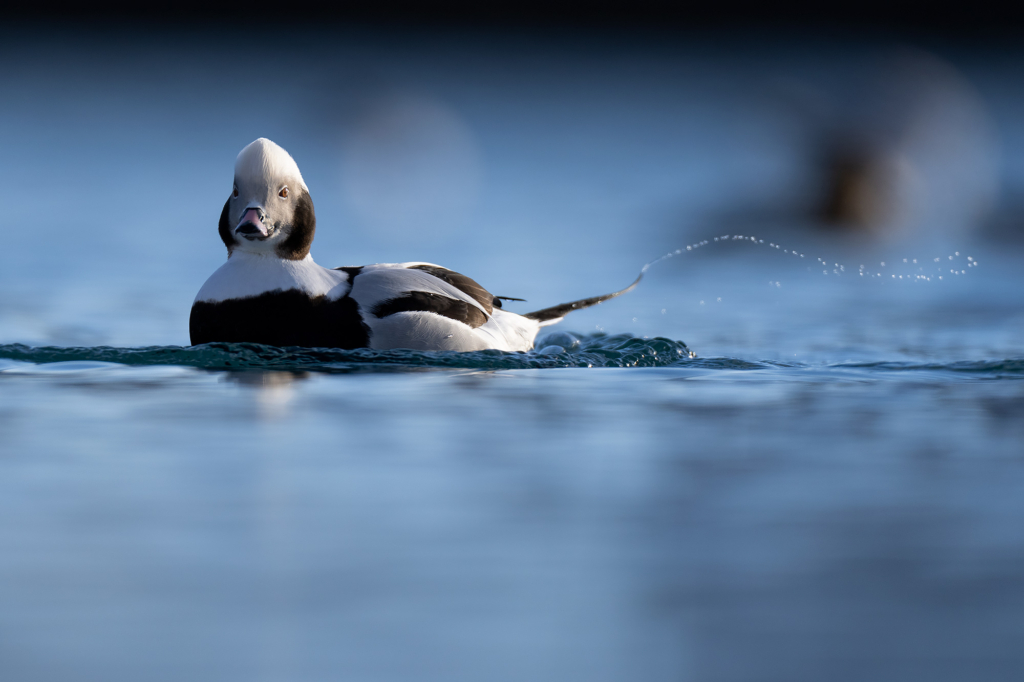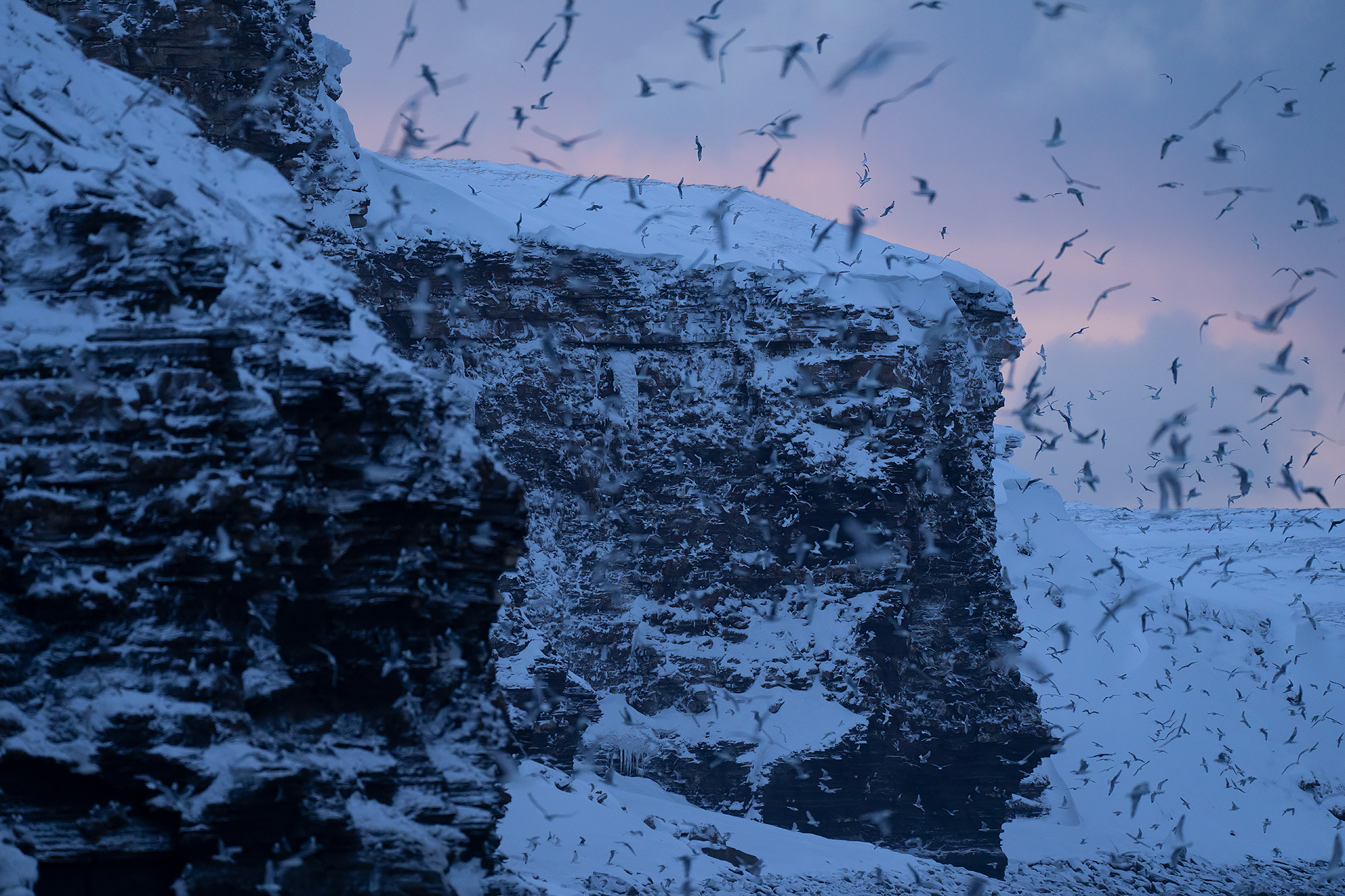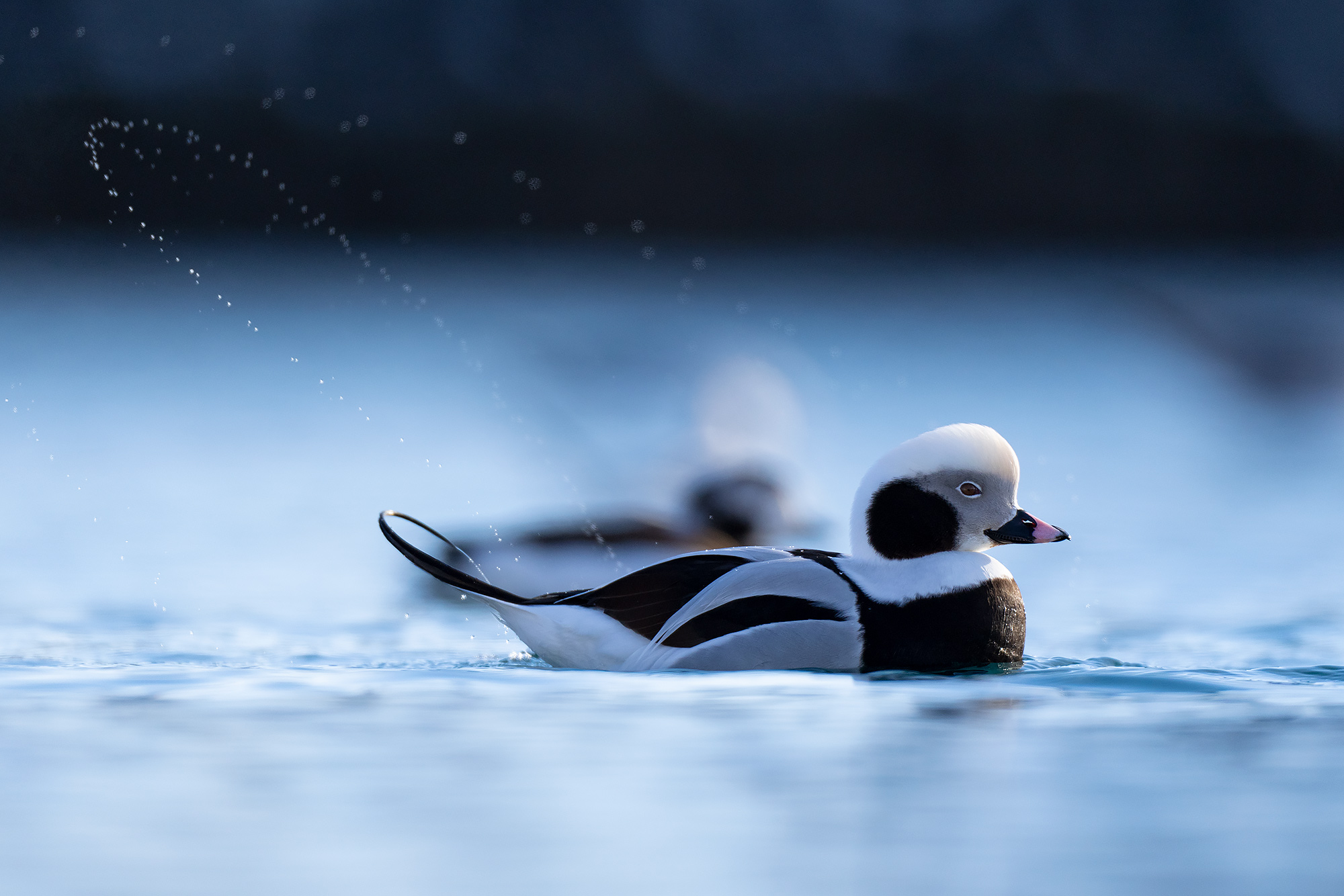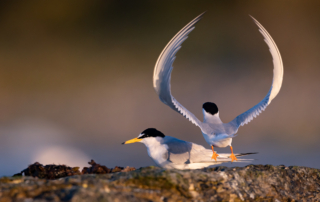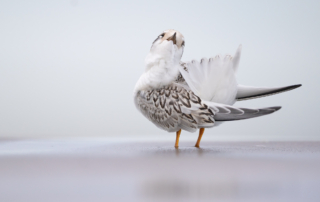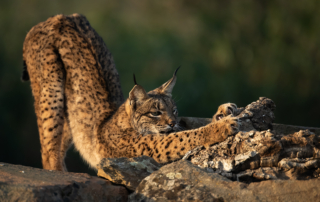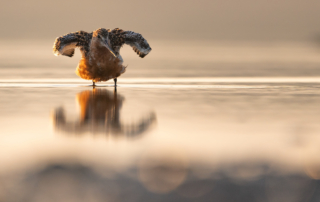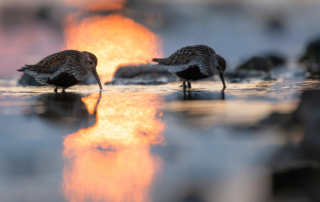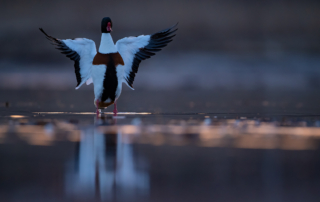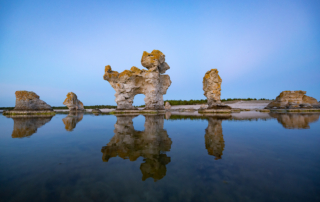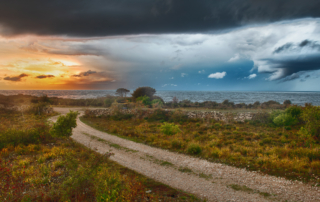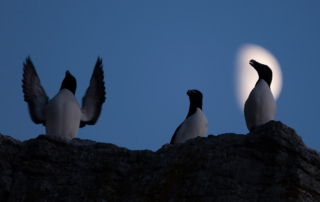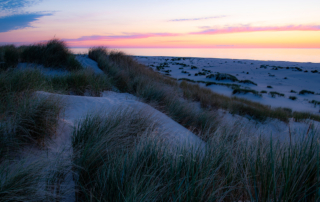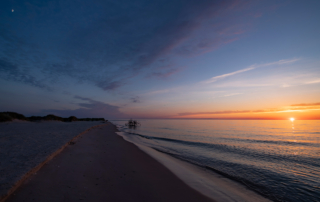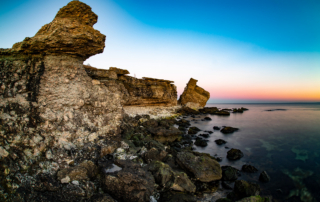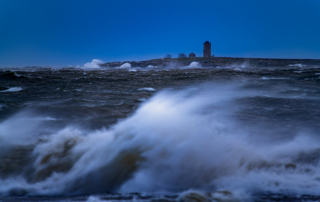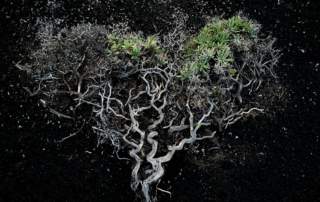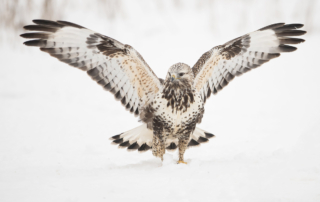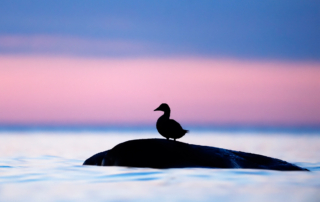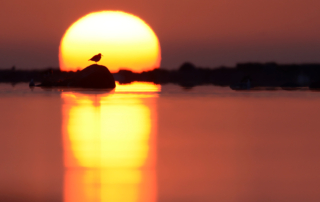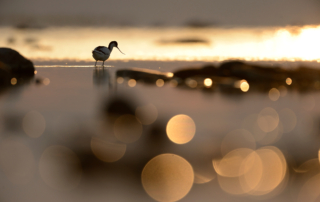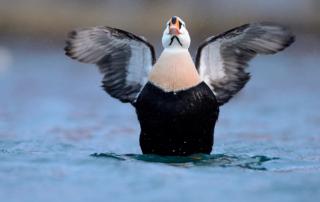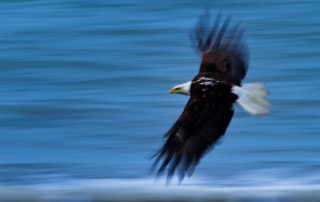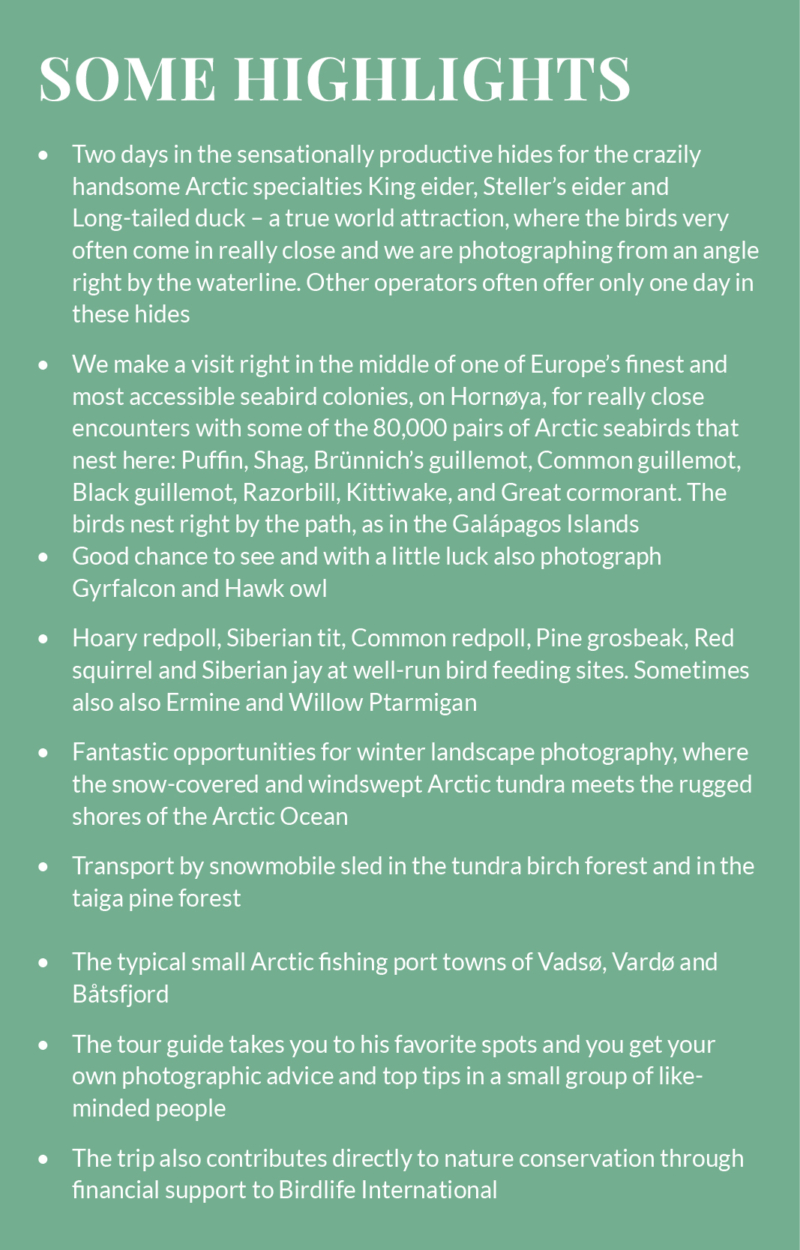
VARANGER
A unique Spring/Winter week, where we have selected some of the very best bird and landscape photo opportunities on the Varanger Peninsula in Norway. Up here, the taiga forest meets the windswept, snow-covered tundra and the dramatically rugged coastlines of the Arctic Ocean. Ancient agricultural lands dating from long before the Viking Age stretch in a thin border along the coast. Inside of that, after a narrow fringe of low birch forest, the open tundra stretches mile after mile within the Varanger Peninsula National Park. At this time of year, these are a snowy winter landscapes in sub-zero temperatures, in wonderful Arctic winter light that can offer strong pastel colors, long shadows, dramatic clouds, snowfall and brilliant photo opportunities of many different kinds. The snow-covered tundra landscape shows us the still reasonably undisturbed quality of the Arctic wilderness up here.
KING EIDER, STELLER´S EIDER, COMMON EIDER AND LONG-TAILED DUCK
We photograph the almost unbeliavably elegant Arctic ducks King eider, Steller’s eider, Common eider and Long-tailed duck from custom-built floating pontoon hides, where we lie, dry, safe and comfortable, right at birds’ eye level just above the waterline. These world-unique and world-famous floating hides give us phenomenal opportunities for close encounters with these truly picturesque High Arctic ducks, so we decided to invest two days in these hides, in order to maximize our chances of fine pictures of these charismatic birds, taking into account the always fickle factors of light and weather.
HORNØYA
With its handsome lighthouse and its charismatic location, right at the final outer skerries before the Arctic Ocean, this little island is one of Europe’s finest and most accessible seabird colonies and also Norway’s easternmost point, in line with Istanbul! Everyone with a passion for the natural world, should at some point in life treat themselves to visit a teeming and pulsating bird cliff, where there is action in all directions, all around the clock.
We step ashore in the intense and fabulously well-populated bird colony here, with its 80,000 pairs of Brünnichs guillemot, Shag, Puffin, Cormorant, Common guillemot, Black guillemots Razorbill and Kittiwake, just during the time when the Puffins usually arrive in large numbers for the breeding season. Hornøya is often considered having Norway’s finest bird cliffs. The seabirds here also usually make themselves very easily available for fantastic photo opportunities. The birds nest almost on the path and have very different things to think about, than about us, almost like in the Galápagos Islands. For those who shoot film, do not forget to bring the microphone, because the soundscape here is absolutely stunning and the din intense. Often a Gyrfalcon or White-tailed eagle comes by in search of prey in the slopes of the bird mountain and not infrequently they show up at fairly good photo distances, as long as you are quick and observant enough and have a little luck …
THE TUNDRA
We also meet the landscapes of the snow- and wind-shaped Arctic Tundra in several places up here, both in the mountains and down at the edge of the mountain birch forest. A snowmobile sled ride takes us to a bird feeding site near a mountain stream, where good chances are usually possible to photograph species such as Hoary redpoll, Common redpoll, Siberian tit and Willow tit. There is also often a Hawk owl or two around here and sometimes Ermine or Willow ptarmigan are seen here.
THE TAIGA FOREST
In Pasvik National Park we meet the wild Taiga forest with its Scots pines, plus some of its winter bird species. Here we go for a snowmobile sled ride out into the woods and take photos at a proven feeding site for squirrels and birds such as Siberian tit, Pine grosbeak, Willow tit, Siberian jay and sometimes a Hawk owl paying a visit. At times Willow grouse hang around here, in their snow-white winter dress.
Itinerary
Day 1 (20/3) (Dinner)
We meet up at Kirkenes airport (KKN), and depart by minibus to the small fishing port town Vadsø. Dinner and overnight at hotel.
Day 2 (21/3) (Breakfast – Lunch – Dinner)
Early breakfast at the hotel, then to the small fishing town of Vardø and from there with the harbor guard’s ship the short trip over to Hornøya, a small, treeless island with a handsome lighthouse and a steep bird cliff with a phenomenal seabird colony of approx. 80,000 pairs of Kittiwake, Shag, Puffin, Razorbill, Brünnichs guillemot, Common guillemot, Great cormorant and usually with daily visits by Gyrfalcons and White-tailed eagles. One of the finest bird cliffs along the whole Norwegian coast. Packed lunch from the hotel. In the afternoon back to Vardø and further along the coast to Vadsø. Overnight and dinner at hotel.
Day 3 (22/3) (Breakfast – Lunch – Dinner)
Early breakfast, then a trip by snowmobile sled to a private bird feeding site with hides, which attracts a number of birch forest and tundra birds up close. Common species here include Hoary redpoll, Common redpoll, Siberian tit, Greenfinch and Willow tit. Sometimes an Ermine shows up, or a Willow ptarmigan. Hawk owls often hang around. After lunch we continue through a beautiful mountain tundra landscape to the small fishing village of Båtsfjord on the north coast of the Varanger Peninsula. Overnight and dinner at hotel.
Day 4 (23/3) (Breakfast – Lunch – Dinner)
Early departure before dawn to the well-placed floating pontoon hides in Båtsfjord. Amazingly close encounters with Arctic ducks such as King eider, Steller’s eider, Long-tailed duck in their finest breeding outfits. Brunch package from the hotel. Half day in the hides places and then a boat trip with a RIB boat among the flocks of Arctic ducks and gulls in the fjord. Overnight and dinner at hotel..
Day 5 (24/3) (Breakfast – Lunch – Dinner)
Early departure before dawn for a second round in the floating hides in Båtsfjord. This is to give as many photo opportunities as possible on these fantastic Arctic ducks, in case the forces of weather or light have not been completely with us the previous day. Brunch package from the hotel. Half day in the hides and then travel on to the Taiga forest in the Pasvik National Park. Overnight and dinner at guesthouse in Pasvik.
Day 6 (25/3) (Breakfast – Lunch – Dinner)
Early breakfast at the guesthouse. Full day in the taiga forest, including a snowmobile sledge trip to a private bird feeding site that often attracts species such as Pine grosbeak, Siberian tit, Siberian Jay, Red squirrel and sometimes Hawk owl. Opportunity for a wood-fired sauna on the banks of the Pasvik River for those who so wish. Overnight and dinner at the guesthouse in Pasvik.
Day 7 (26/3) (Breakfast)
Breakfast at the guesthouse, then transfer in our minibus back to Kirkenes airport.
Photographic leader
Magnus Martinsson, born in 1964, is a photographer, author and biologist, living on Gotland since 1988. He has since devoted himself to nature conservation issues in the profession. His interest in nature and photography has taken him on a large number of trips around the world and also gained in-depth knowledge of the Gotland homeland. Magnus contributes in various ways to conveying his knowledge to a broad public. He is a frequently hired speaker, excursion and tour guide. Magnus Martinsson is responsible for photography and text in a large number of publications. As a member of Naturfotograferna, he is one of the leading nature photographers in the country.



